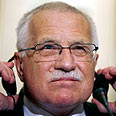
European Union reform treaty signed
Czech president reluctantly endorses Lisbon Treaty, ending his efforts to block proposed pact and paving way for it to finally enter into force
Czech President Vaclav Klaus reluctantly endorsed the European Union's crucial reform treaty on Tuesday, ending his efforts to block the proposed pact and paving the way for it to finally enter into force.
Klaus, who has been highly skeptical of increasing the EU's powers, signed the Lisbon Treaty at the Prague Castle at 3 pm (1400 GMT), hours after his nation's Constitutional Court ruled that the document was in line with the country's constitution.
Klaus has been tirelessly attacking the document, claiming it would hand too much power to European Union institutions in Brussels. He was awaiting the Brno-based court's ruling before deciding whether to endorse it.
"I expected the decision of the Constitutional Court and respect it," Klaus told reporters Tuesday afternoon, but added he vehemently disagrees with the verdict.
"The Czech Republic will cease to be a sovereign state," once the treaty enters into force, he said.
Klaus was the last obstacle to the full ratification of the treaty, which is designed to transform Europe into a more unified and powerful global player. The charter, which was bogged down in negotiations for almost a decade, has been ratified by all other 26 EU nations.
The Constitutional Court's chief judge, Pavel Rychetsky, said the Lisbon Treaty "does not violate the (Czech) constitution" and that all formal obstacles for ratification "are removed."
In Brussels, European Commission President Jose Manuel Barroso said he was "extremely pleased" with the court's verdict.
"I hope that we can now move forward as quickly as possible on the nomination of the president of the European Council and vice president of the Commission High Representative," he said, referring to the newly created post of president, who will chair EU summits, and the bloc's new foreign policy chief, who will represent the EU abroad.
'Last hurdle cleared'
Jerzy Buzek, president of the European Parliament, had appeared confident Klaus would sign the treaty, adding it should now enter into force by the end of the year.
Earlier in the day, British Prime Minister Gordon Brown said he hoped that would happen "very soon."
"It is high time for us to leave the internal reform discussions behind us," said German Foreign Minister Guido Westerwelle.
Czech Prime Minister Jan Fischer welcomed the court's verdict. "The last hurdle has been cleared," Fischer said.
The court was asked to rule by a group of senators who filed a motion arguing the treaty was not in line with the constitution. Last year, the court dismissed a similar complaint.
Failure of the treaty would send the EU into an unprecedented crisis. Negotiators say its reforms – creating a new EU president post, giving more power to the foreign policy chief and streamlining EU decision-making – are needed to make the EU more effective.
Last week, EU leaders agreed to Klaus' last-minute demand – an opt-out from the treaty's Charter of Fundamental Rights in return for his signing of it. Klaus said he was not planning to make any further demands.
The Czech leader asked for the option over worries of property claims by ethnic Germans stripped of their land and expelled after World War II.
But it was considered Klaus had used the demand for the opt-out to try to scuttle ratification of the treaty, which he opposes.










